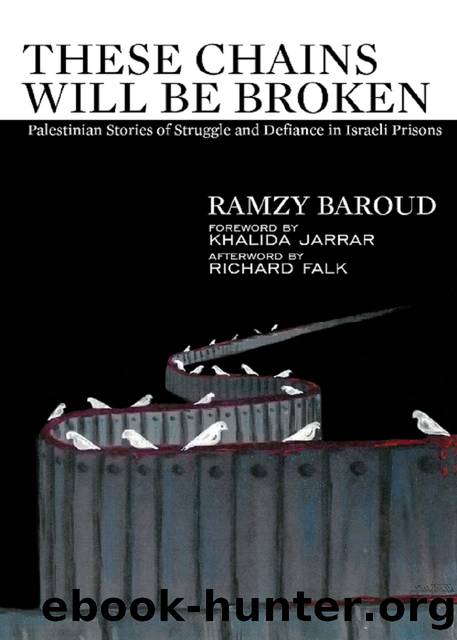These Chains Will Be Broken: Palestinian Stories of Struggle and Defiance in Israeli Prisons by Ramzy Baroud

Author:Ramzy Baroud [Baroud, Ramzy]
Language: eng
Format: epub
Tags: history, Middle East, Israel & Palestine, political science, human rights, World, Middle Eastern
ISBN: 9781949762099
Google: Gnu9wgEACAAJ
Publisher: Clarity Press
Published: 2019-11-15T23:20:37.401953+00:00
46 See Appendix.
47 The Palestinian Prisoners Club is a non-governmental organization that was established in 1993 to support political prisoners in Israeli occupation jails. âPalestinian Prisoners Club,â Facebook, accessed July 29, 2019, <https://www.facebook.com/ppc1993/>.
13
HUMANITARIAN HERO
Mohammed Khalil al-Halabi
ânarrated by his father, Khalil al-Halabi
MOHAMMED Khalil al-Halabi was born on April 2, 1978. He is the second of seven brothers. The al-Halabi family was ethnically cleansed from the town of Al-Majdal in historic Palestine in 1948, to live in permanent exile ever since. Mohammed was born and raised in the Jabaliya refugee camp in the Gaza Strip.
In 2003, Mohammed earned a Masterâs degree in Civil Engineering from the Islamic University of Gaza. He is married with five children: Khalil, 15, âAsem, 13, âAmro, 9, Rital, 6, and Faris, 4.
In 2006, Mohammed became the Director of World Vision in Gaza, a US charity organization that, for 40 years, provided essential support to Palestinian communities in Jerusalem, the West Bank and Gaza, âserving the most poor and marginalized.â A large portion of World Visionâs budget is provided by the Australian government.48
The charityâs work, like that of other international NGOs operating in the Gaza Strip, became critical after 2006, when Israel imposed a siege on the already impoverished region. Worsening an already difficult situation, several Israeli warsâstarting in 2008âkilled thousands of Palestinians in Gaza and destroyed much of the economic infrastructure of the Strip, leaving nearly half the population living under extreme poverty.49
It was then that Mohammedâs work became essential for the survival of many, especially terminally ill cancer patients and families of fishermen and farmers who had lost their only source of income.
On June 15, 2016, Mohammed was arrested by Israeli occupation forces at the Beit Hanoun (Eretz) Crossing which separates besieged Gaza from Israel, in a joint operation carried out by the Shin Bet security service, the Israeli army and Israeli police. Since then, many have speculated that the real motives behind Mohammedâs detention were to sever the last line of international support that has allowed Gaza to survive, despite the siege and war.
Coupled with the numerous Israeli-imposed restrictions on the UN refugee agency in Palestine, UNRWA, and other similar groups, Mohammedâs case fits neatly into a larger trajectory of Israeli efforts to undermine international support for the Palestinian people.
To obtain a confession, Israel has subjected Mohammed to what the Palestinian Commission of Detainees and Ex-Detaineesâ Affairs refers to as âone of the longest trials in the history of the Palestinian captive movement.â50
Download
This site does not store any files on its server. We only index and link to content provided by other sites. Please contact the content providers to delete copyright contents if any and email us, we'll remove relevant links or contents immediately.
| Africa | Americas |
| Arctic & Antarctica | Asia |
| Australia & Oceania | Europe |
| Middle East | Russia |
| United States | World |
| Ancient Civilizations | Military |
| Historical Study & Educational Resources |
Never by Ken Follett(3154)
The Man Who Died Twice by Richard Osman(2515)
Machine Learning at Scale with H2O by Gregory Keys | David Whiting(2513)
Fairy Tale by Stephen King(2403)
Will by Will Smith(2255)
Rationality by Steven Pinker(1900)
The Dark Hours by Michael Connelly(1740)
The Dawn of Everything: A New History of Humanity by David Graeber & David Wengrow(1728)
Friends, Lovers, and the Big Terrible Thing by Matthew Perry(1587)
Can't Hurt Me: Master Your Mind and Defy the Odds - Clean Edition by David Goggins(1530)
Principles for Dealing With the Changing World Order: Why Nations Succeed and Fail by Ray Dalio(1509)
A Short History of War by Jeremy Black(1431)
Go Tell the Bees That I Am Gone by Diana Gabaldon(1353)
HBR's 10 Must Reads 2022 by Harvard Business Review(1353)
515945210 by Unknown(1295)
Oathbringer (The Stormlight Archive, Book 3) by Brandon Sanderson(1266)
Fear No Evil by James Patterson(1179)
443319537 by Unknown(1140)
Works by Richard Wright(1100)
